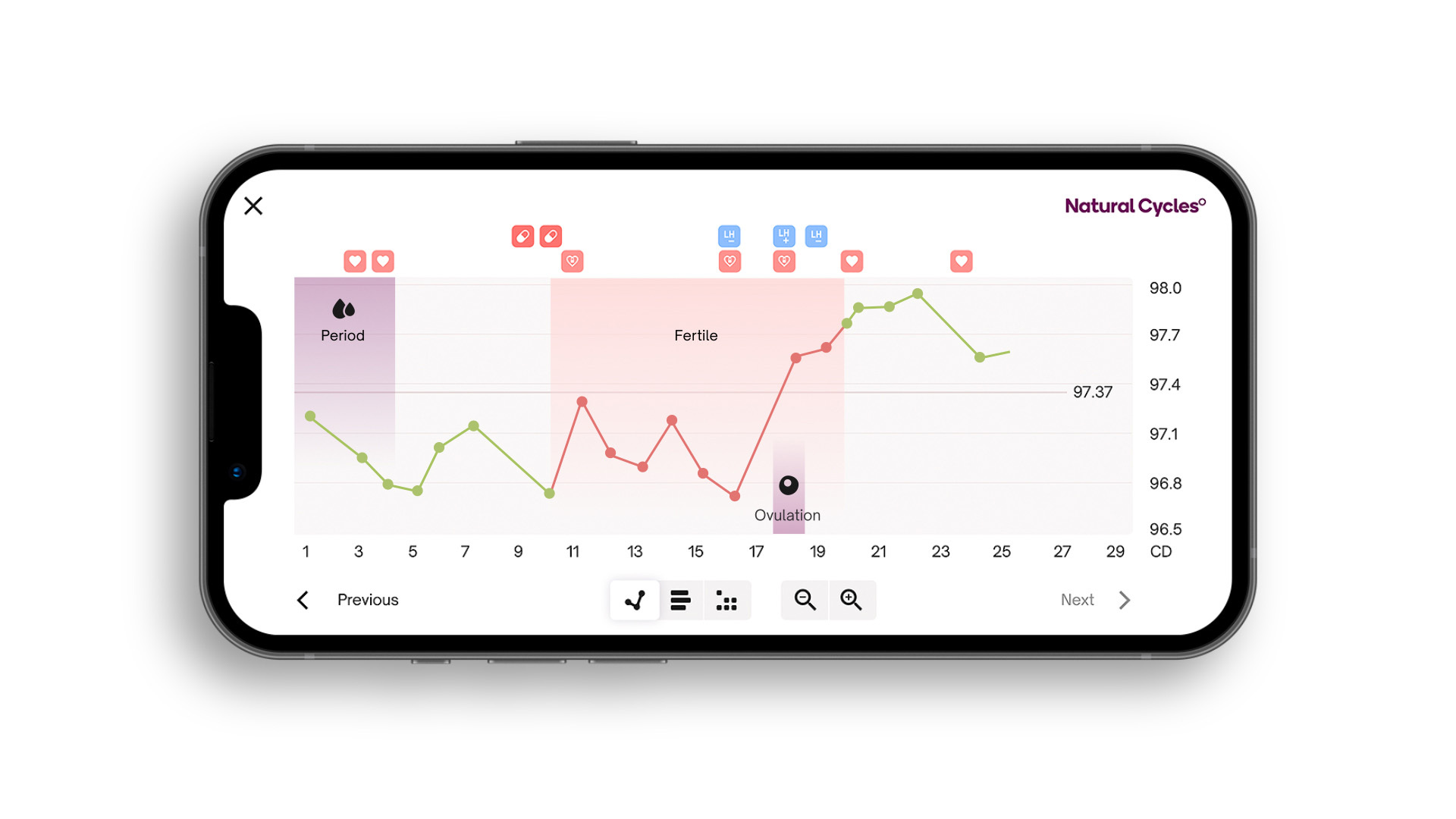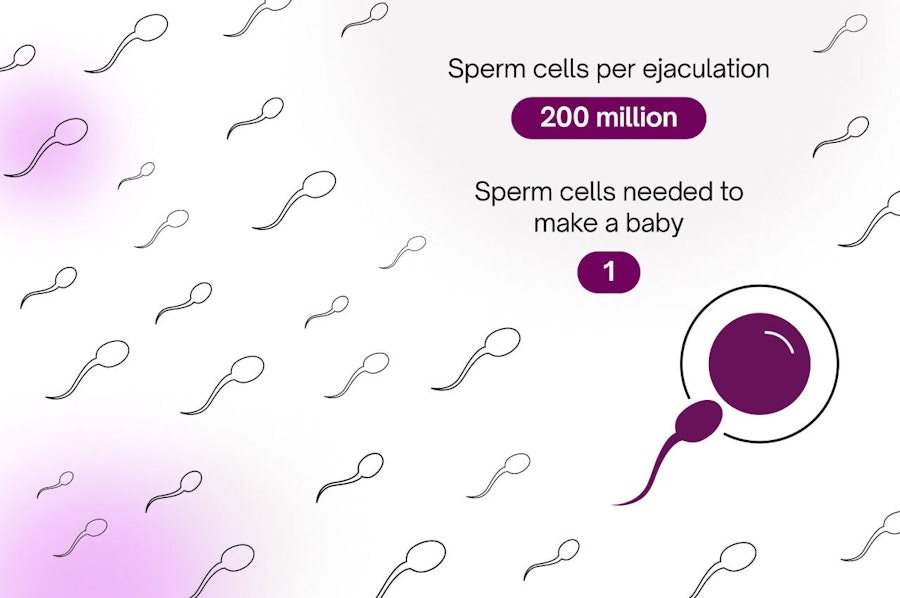How long do sperm live?
Key takeaways:
- Sperm can live in the female reproductive system for as long as five days, depending on the environment
- Sperm are continually produced in the testes, meaning most men are fertile throughout their lifetime
- Sperm quality is an important factor in fertility and can be promoted by making healthy lifestyle choices
This article is also available in Spanish
How long do sperm live?
Sperm are continuously produced—with around 100 million made each day—and can live for several months inside the testes. Outside the body, the sperm survival rate is much shorter. The life span of sperm depends on its conditions and circumstances.
Let’s take a look at how long sperm can survive under some normal versus extreme conditions:
-
How long do sperm live in testicles?
It takes 75 days to make a sperm. After they are made, they remain in the testes for a few weeks. If they aren’t ejaculated, the sperm cells die and are reabsorbed by the body.
-
How long can sperm survive inside the female body?
Amazingly, sperm can live inside the female reproductive system for up to five days. Although this depends on the right conditions. Around peak fertility, our bodies can promote sperm survival by producing a type of cervical mucus that protects sperm and makes it easier for them to get to the fallopian tubes, where fertilization takes place.
-
How long do sperm live outside the body on dry surfaces?
Without warmth and moisture, sperm cannot survive long outside the body. Sperm typically die within minutes when exposed to air or landing on dry surfaces and skin.
-
Can sperm survive in water?
No – sperm cannot survive in water. If you have unprotected sex in water, there is a risk of pregnancy, but you cannot get pregnant just from being in the water of a swimming pool or hot tub. Not only will sperm disperse in water and become separated from the fluids that protect them, but any soap or chemicals in the water will kill off any sperm pretty quickly.
-
How long does frozen sperm last?
When stored at a cryobank and kept at a consistent freezing temperature of minus 196 degrees centigrade, sperm can survive indefinitely. In the US and the UK, sperm banks usually allow donors to store frozen semen for up to 50 years.
How much sperm does it take to get pregnant?
It only takes one sperm cell to fertilize an egg cell – and each ejaculation contains millions of sperm cells! However, without the right conditions, sperm can only survive for a few hours inside the female reproductive system.
A woman’s cervical fluid will change depending on where she is in her cycle. Just before and during ovulation, the cervical mucus becomes clear, wet, and slippery, creating a sperm-friendly environment that can help protect the sperm. Even with these optimal conditions, only a small number of sperm will survive the swim and make it to the fallopian tubes to meet the egg. Knowing your fertile window can help you better understand your reproductive health.
Males might be fertile at any time, but you cannot get pregnant every day of your cycle. There are only a small number of days in any cycle when you’re fertile. After ovulation, an egg cell can only survive for about 12-24 hours. Since sperm can live for up to five days in the female body, this means the fertile window is six days long in total.
Sex around the time of ovulation increases the likelihood of conception – this gives sperm enough time to reach the female egg cell before the sperm cells start dying off.

When is the best time to use emergency birth control?
Emergency birth control options are available for unexpected and unprotected intercourse. There are two types of emergency birth control available: the morning-after pill and the copper IUD.
Emergency birth control works by delaying ovulation or preventing the implantation of a fertilized egg cell. It’s best to use emergency birth control as soon as possible after having unprotected sex, and emergency contraception can still be effective for up to five days after intercourse.
What is the life cycle of a sperm?
The sperm life cycle is complex – spermatogenesis (sperm cell production) varies between individuals, but on average, it takes about two months for new sperm to be made. Immature sperm cells will divide multiple times within the testes, resulting in the production of the tadpole-like cells (with a head and tail) we recognize as sperm.
For sperm to be made, the testicles and the hormone-producing glands that help to trigger sperm production need to function normally. Problems with any of these systems can impact sperm production. Talk to your healthcare professional if you or your partner have any concerns about sperm health and fertility.
Sperm quality and health
A male can continue to make sperm throughout his lifetime. However, as a man ages, the quality of his sperm and the amount he produces may degrade. If you’re trying to get pregnant, sperm quality can be an important factor when it comes to your chances of conception. Good quality sperm has a better chance of surviving and fertilizing the egg cell. The best way to promote sperm quality is to lead a healthy lifestyle. Talk to your doctor if you have concerns about sperm quality.
What are some lifestyle changes you can do to improve sperm health?
Try these healthy lifestyle tips to help improve sperm quality:
- Eat a healthy range of foods to get the right nutrients and help make sure sperm production is optimal
- Relax and minimize stress where possible
- Exercise regularly
- Get enough zinc
- Prevent sexually transmitted infections
- Wear loose underwear
- Avoid frequent hot baths
- Keep the temperature of the testicles lower than the body temperature
- Quit smoking and recreational drug use
Natural birth control and sperm survival
Birth control can help you prepare for your future. Hormonal birth control works by stopping ovulation. Without an egg cell to fertilize, sperm die inside the female reproductive system. Condoms work as a barrier method by preventing sperm and egg cells from meeting. However, there is a birth control method that takes sperm survival into account: Natural Cycles is a non-hormonal, non-invasive birth control method that adapts to your cycle, learning its pattern.
Our app can predict and confirm ovulation based on basal body temperature. The Natural Cycles algorithm learns the unique pattern of your cycle and can predict your fertile window (those six days in the cycle when you can get pregnant). The algorithm also adds a couple of buffer days to account for ovulation moving because our bodies don’t always behave like clockwork!
When you know your fertile days, you can choose to either use a condom or abstain from having sex for the duration of the fertile window. On all the other days of your cycle, you’re not fertile, so there’s no need to use protection. Natural Cycles caters to your unique fertility journey, and the science that’s used to prevent pregnancy can also be used to plan pregnancy when the time is right. Why not find out if it could work for you today?
Did you enjoy reading this article?
